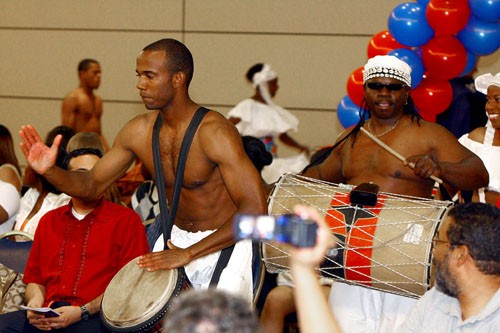Surrounded by tens of thousands of their peers, graduating seniors can get lost in the crowd — but the UA’s cultural centers give students a special ceremony.
Despite the creation of the Multicultural Affairs and Student Success office last year and the recent budget cuts, many groups are able to have their own cultural and diversity centers on campus.
Native American Student Affairs, Asian-Pacific American Student Affairs, Chicano/Hispano Student Affairs and African American Student Affairs are all offering their own convocation ceremonies.
The Asian-Pacific American Student Affairs convocation was the first of the four, held during the first week of May.
Asian-Pacific American Student Affairs Director Danthai Xayaphanh noted that although recent budget cuts have not dramatically affected the ceremony, this, the 17th annual convocation, eliminated dinner from its graduation ceremony program.
“”It is important to acknowledge the diversity and success of Asian Americans/Pacific Islanders on this campus,”” said Xayaphanh. “”As a predominately white institution, the struggles and successes of marginalized populations like ours is not often recognized. This celebration offers a sense of community amongst our population and showcases the amazing contribution of APA students.””
Xayaphanh noted that unlike many of the other cultural centers on campus, Asian-Pacific American Student Affairs focuses not only on their uniqueness within the community as a whole but also the diversity within the Asian and Pacific Islander population, noting “”each student brings a very distinct culture and identity.””
Native American Student Affairs also had its convocation in early May. Sharing the same building, the centers worked to provide their students with a specialized ceremony.
This week, two of the centers will hold their own, smaller convocations.
A special convocation held today from 4:30 – 6 p.m. in Centennial Hall is important to acknowledge the students’ special achievements, said Socorro Carrizosa, program director of the Chicano/Hispano Student Affairs.
“”This year is the first year that it’s entirely university supported,”” Carrizosa said. Previous years have been funded by local businesses, but this year the university, despite budget cuts, funded the entire commencement ceremony.
The convocation will have a mariachi band and the ceremony will be presented in both English and Spanish.
“”People are always coming up saying, ‘My grandma was there and it was in Spanish and it really spoke to her,'”” she said.
Chicano/Hispano Student Affairs isn’t the only office honoring its students with special cultural features.
The African American Student Affairs convocation will feature African dance.
“”One of the remarkable things and the process of budget cuts is that we tried to preserve some of these things that are really valuable to students,”” said Maria Moore, program director of African American Student Affairs. “”This convocation is one of those things.””
Moore said the convocation of around 40 graduates and 200 participants is a great way to show the students African American Student Affairs’ appreciation. In fact, she said their families’ reaction is one of the reasons they continue to host the event.
“”I think it’s really celebrating that moment with the students when their name is called, they step up on the stage and the picture and the celebration of those folks in the rows when they see their son or daughter graduate,”” Moore said. “”Those are the parts of the celebration that I really enjoy the most.””
Moore said the convocation stands apart because of the personal messages and pictures each graduate can place in the ceremony, where they will receive either green, blue or black Kente stoles depending on whether they are graduate or undergraduate students. Green stoles symbolize growth; blue represents harmony, peace and love; and black stoles, for the graduate students, represent spiritual potency and maturity.
Despite the turmoil of programs getting cut, Moore said events like a specific center’s graduation ceremony help provide a sense of community.
“”These smaller ceremonies allow us to share a uniqueness and affirm cultural identities,”” Moore said. “”(Graduation) is both an individual achievement and the achievement for the community.””









